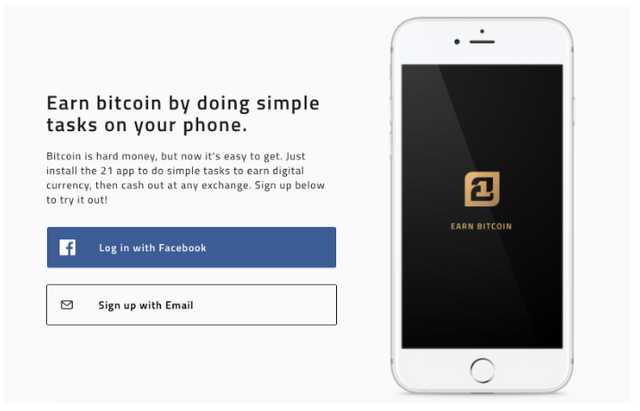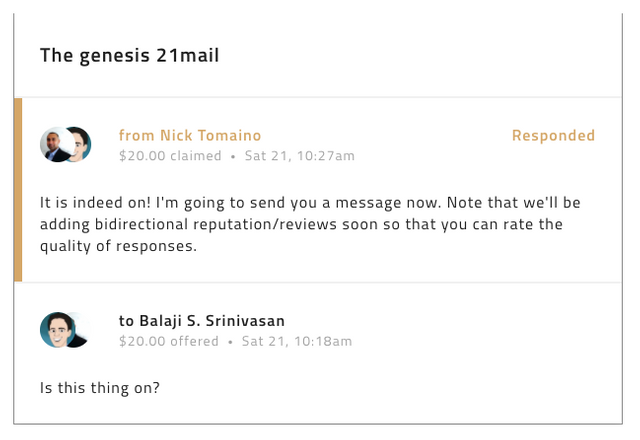Earn Anywhere with the 21 App
I’ve been waiting for a Bitcoin app to show my non-techie friends for 4+ years. It’s finally here: 21.

The vast majority of people in the world would like to more efficiently manage and monetize their time. An unemployed person in Indonesia has a lot of time and little money; the 21 app allows him to earn bitcoin for small tasks. A wealthy VC in Silicon Valley has a lot of money but little time and struggles to effectively filter communications; the 21 app filters out spam and makes it easier for her to communicate with the people who really want to communicate with her and also allows her to monetize time spent communicating (either directly or to a charity). See A16Z co-founder Ben Horowitz’s 21 profile here— all of his bitcoin earned goes to BlackGirlsCode.
Why Bitcoin?
A question you may have is why Bitcoin? Mechanical Turk is an Amazon-owned marketplace for small tasks that has been around for 11+ years, paying out users in U.S. dollars, Indian rupees and Amazon credits. There are a number of other micro-task apps like Spare5 and Gigwalk that people in the U.S. use to earn money.
The reason a Bitcoin-enabled micro task marketplace is a game changer is because Bitcoin is inherently global. All of the existing micro task solutions do not work well for the majority of the 2.1B people who have smart phones. The 21 app does though. It’s a global marketplace for people’s time and attacks the biggest opportunity blockchains have: connecting the global economy.
How to use the 21 app?
I’ve been beta testing the app for a month and have earned over $70 by completing tasks ranging from reviewing Uber’s latest app and the book The Sovereign Individual to filling out a survey about my television usage. For anyone who wants to start earning quickly in their spare time for simple tasks, 21 is a great solution.
Another interesting use case for the app that I’ve experimented with is “21mail” — the bitcoin version of LinkedIn’s InMail. You can create an account and charge $1, $5, $10, $20 or $50 to respond to emails from anyone in the world. I recently shot 21 co-founder and CEO Balaji a 21mail for $20, and he quickly responded:

This led to a brief Q&A with Balaji, who has been in the news lately for non-21 related reasons. Our chat stuck to Bitcoin though.
Here it is:
NT: There has been a lot of excitement about Ethereum and other blockchains in the past year. Why have you guys continued to focus on Bitcoin and what do you make of the increased activity in other blockchains?
BS: Good question. We have a few thoughts on that. First: we are pro-Bitcoin, but not anti-Ethereum. With that said, we're pragmatists. If a given community offers the right tool for the job, we will use that.
Second: we think the Gartner Hype Cycle is almost a law of nature in technology. Everything goes through this trigger where it gets massively hyped and then there's a trough when people try to actually use it for something and find it's harder than they expected. Sometimes there are multiple peak/trough cycles. With Bitcoin, these peaks/troughs are reflected in the price graph itself. Bitcoin had its first peak in 2011, its second peak in early 2013, and its third in early 2014. After that early 2014 peak, Bitcoin then had a long trough which it started gradually recovering from.
Ethereum and Blockchain (in the sense of private permissioned ledgers) also went through hype cycles with peaks arguably in 2016. They are in the middle of their time in the wilderness. I think people in those respective communities like Vitalik Buterin and Adam Ludwin (of Chain.com) are very sharp and we will eventually see some amazing things built on those two technologies. There is after all a continuum between a 2-party "private blockchain" like a payment channel, an internal database used for off-chain transactions, and a full public immutable ledger like Bitcoin or Ethereum. Different performance considerations may determine which technology one uses for a particular use case, like switching gears on a bike to navigate hilly terrain.
Arguably altcoins themselves went through a peak/trough cycle correlated with Bitcoin, and now we will see more of those (like ZCash) being put out there to solve issues that the main Bitcoin blockchain was not engineered to handle. Companies like Shapeshift certainly make it easier to trade in altcoins, and there are new funds emerging like Polychain focused on just altcoin trading.
Given this background, to answer your question: one of the easiest mistakes to make is to switch from a technology in the trough of the hype cycle to one at the peak of the hype cycle. This ensures that you will encounter a new trough very soon. We are of course big Bitcoin supporters. But these pragmatic reasons are also part of why we continued to focus on Bitcoin, and did not switch to Ethereum or private blockchains. Those two will likely be useful technologies, but let them get out of their troughs first.
NT: How does the new app fit with the overall focus of 21?
BS: The new app is built on the 21 micropayments software that we open sourced last year. Indeed, you can see the v1 version of the concept in this tutorial that we released all the way back in November 2015:
In this tutorial we’ll show you how to set up a server that will allow anyone to send you an SMS for a small amount of bitcoin — without revealing your phone number. The example can be extended to any other form of out-of-network social messaging, such as an email from someone you haven’t met or a Twitter DM from someone you haven’t followed. It’s a way to monetize your inbox and widen the circle of people who can contact you.
While obviously the new app is useful in its own right, you can also think of it as the flagship app that shows what you can build with the 21 developer tools. We will likely make each person’s profile page 402-capable over time as the first production high value machine-payable endpoints.
NT: What use cases of the new app are you most excited about?
BS: The single most obvious use case is simply to replace your public email address with a 21.co profile. You can then paste the profile URL anywhere you would normally paste a public email address, like on your Twitter or LinkedIn pages, or on your personal website.
Fulfilling the vision of a machine-payable web
While the media has recently speculated a bit about Balaji’s future plans, it’s clear to me that he’s laser focused on bringing the vision of a machine-payable web to the world. This is good news for the Bitcoin (and broader blockchain) community.
NOTE: THIS WAS ORIGINALLY PUBLISHED ON MEDIUM

About me: I run The Control and am an investor at Runa Capital, an early stage venture fund. Previously, I worked on business development and marketing at Coinbase. Follow me on Twitter, signup for our newsletter and support us by upvoting on Steemit :)
This post has been ranked within the top 80 most undervalued posts in the first half of Feb 03. We estimate that this post is undervalued by $4.51 as compared to a scenario in which every voter had an equal say.
See the full rankings and details in The Daily Tribune: Feb 03 - Part I. You can also read about some of our methodology, data analysis and technical details in our initial post.
If you are the author and would prefer not to receive these comments, simply reply "Stop" to this comment.